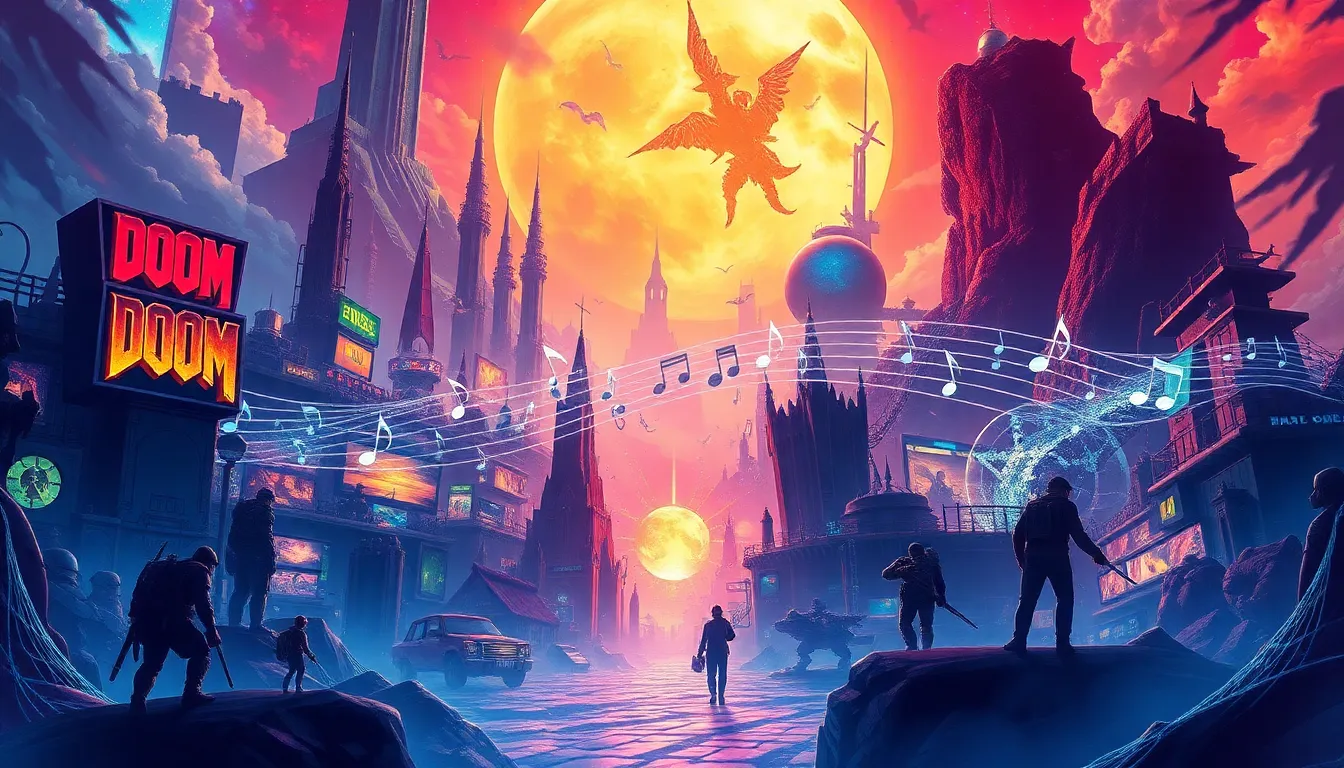When it comes to PC gaming, the graphics may dazzle and the gameplay might thrill, but let’s not forget the unsung hero of the experience: the soundtrack. It’s the auditory magic that transforms a simple game into an epic adventure, making players feel like they’re on a quest to save the universe—or at least their virtual cat.
Table of Contents
ToggleThe Evolution of PC Game Soundtracks
Soundtracks in PC gaming have evolved significantly over the years. They transitioned from basic sounds to intricate compositions that enhance gameplay immersion.
Early Innovations in Sound Design
Early PC game soundtracks relied heavily on synthesized sounds and MIDI technology. Games like “Prince of Persia” featured simple melodies that created atmosphere despite hardware limitations. Soundcards began to integrate polyphonic sound, allowing for richer audio experiences. Titles such as “Doom” showcased these innovations by using complex sound effects alongside catchy tunes. Early developers experimented with sound techniques to maximize emotional impact. Many players recall the distinct audio from these games, as it set the mood and defined gameplay experiences.
The Rise of Orchestral Scores
As technology improved, orchestral scores gained popularity in PC gaming. Games like “Final Fantasy VII” brought cinematic music to players, elevating emotional engagement. Full orchestras scored titles, leading to immersive worlds that complemented visual storytelling. Composers such as Nobuo Uematsu and Jeremy Soule became influential figures, gaining recognition for their contributions. Orchestral arrangements helped bridge the gap between gaming and film industries, with many soundtracks performing in concert halls. The importance of music in creating memorable moments cannot be overstated, as these compositions often resonate with players long after they finish the game.
Iconic PC Game Soundtracks

Soundtracks contribute significantly to gaming experiences, creating lasting memories and enhancing emotions through music.
Classic Titles That Defined Genres
“Prince of Persia” showcased innovative synthesized sounds, setting a standard in platforming games. “Doom” revolutionized FPSs with its atmospheric audio, immersing players in intense combat. “Command & Conquer” influenced the strategy genre by using orchestral themes to build tension and excitement during gameplay. “The Secret of Monkey Island” provided gamers with memorable tunes that complemented its storytelling. Each of these titles not only defined their respective genres but also left an indelible mark on how music shapes gaming experiences.
Modern Masterpieces and Their Impact
“Final Fantasy VII” introduced gamers to orchestral scores that deepened emotional connections, transforming RPG soundtracks. “The Witcher 3: Wild Hunt” featured a rich blend of folk music, enhancing the immersive world of its narrative. “Celeste” employed chiptune-inspired tracks that resonated with players, adding depth to the platforming experience. “Cyberpunk 2077” implemented a dynamic soundtrack that adapted to gameplay, increasing player engagement. Modern masterpieces elevate the role of soundtracks, bridging the gap between storytelling and player immersion.
The Role of Soundtracks in Gaming Experience
Soundtracks greatly enhance the gaming experience by immersing players in the game world and intensifying emotions. Music complements visual elements and gameplay, enriching player interactions.
Enhancing Immersion and Engagement
Soundtracks create an immersive atmosphere by responding dynamically to in-game actions. As players explore environments or face challenges, music shifts to match the intensity of the moment. Titles like “The Witcher 3: Wild Hunt” demonstrate this technique effectively, adjusting musical themes based on player choices. Environments come alive through subtle auditory cues, helping players feel connected to their surroundings. By integrating melodies that reflect narrative arcs, games entice players to engage more deeply with the story.
Emotional Connections Through Music
Emotional resonance often stems from well-crafted soundtracks that mirror character journeys. Games like “Final Fantasy VII” use melodies to echo characters’ struggles, making their experiences poignant. During critical moments, music heightens emotional stakes, allowing players to feel both joy and sorrow. Players remember iconic tracks long after gaming sessions, creating lasting memories. When soundtracks evoke nostalgia, they strengthen bonds with the game and its characters.
Key Composers in the PC Game Soundtrack Scene
PC game soundtracks feature a range of talented composers who enhance the gaming experience and create memorable audio landscapes.
Influential Figures in Soundtrack Composition
Nobuo Uematsu stands as a legendary figure in game music, renowned for his work on the “Final Fantasy” series. Jeremy Soule also gained acclaim for his masterful compositions in games like “The Elder Scrolls V: Skyrim.” Martin O’Donnell contributed significantly to Bungie’s soundtracks for the “Halo” series, creating iconic themes that resonate with players. Other notable composers, such as Austin Wintory, who composed “Journey,” and Yoko Shimomura, recognized for her work on “Street Fighter II” and “Kingdom Hearts,” have also shaped the landscape. These musicians bridge the gap between gaming and film, crafting emotional narratives through their scores.
Emerging Talents Shaping the Future
Numerous emerging talents are influencing the future of PC game soundtracks. Lena Raine, known for her work on “Celeste,” has gained recognition for her innovative blending of genres. Another rising star, Gareth Coker, has made waves with his unique compositions for “Ori and the Blind Forest.” Additionally, Austin Wintory continues to push creative boundaries, expanding narrative depth through his soundscapes. Other emerging composers, such as Jeff Russo, whose work on “Wolfenstein II: The New Colossus” showcases dynamic audio experiences, highlight a diverse range of musical styles. This new generation of composers is redefining what a game soundtrack can achieve, enhancing player immersion and emotional engagement.
PC game soundtracks are more than just background music; they’re an integral part of the gaming experience. As technology evolves so does the complexity and emotional depth of these soundtracks. From the iconic tunes of classic games to the orchestral masterpieces of modern titles, music shapes how players connect with their virtual worlds.
The impact of soundtracks extends beyond gameplay, creating lasting memories and fostering nostalgia. Composers continue to redefine the boundaries of what music can achieve in gaming, enhancing storytelling and immersing players in unforgettable adventures. As players dive into their favorite games, they’ll find that the right soundtrack can elevate their experience to new heights.


